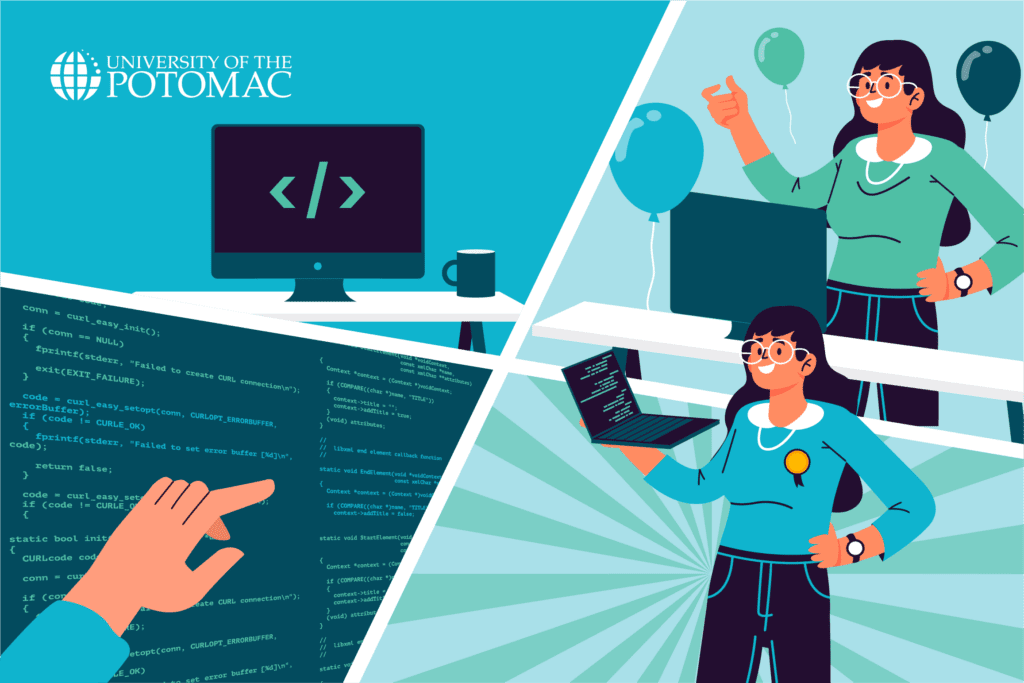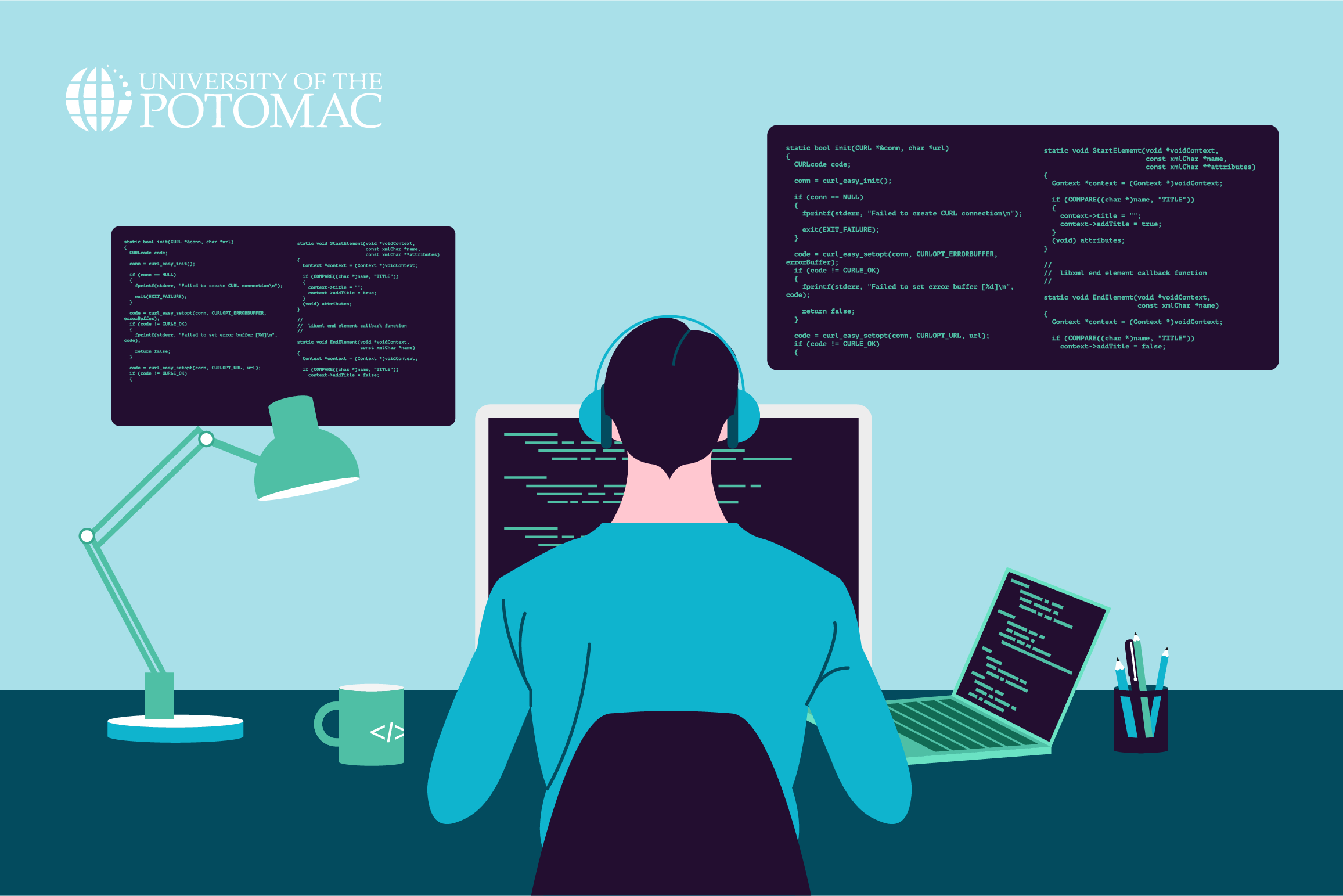Imagine a day without the convenience of smartphone apps, the reliability of online banking, or the efficiency of automated office tools. Software development touches every aspect of our lives, integrating the digital world into our daily routines at both personal and professional levels. From the moment we wake up to the apps that help us sleep, software developers are the professionals behind the digital experiences that define modern living.
As such, it’s no wonder that the field of software development is highly sought after, drawing in those who aspire to innovate and shape the future of technology. If you’re intrigued by the prospects of joining this field, continue reading as we explore how to become a software developer, the essential skills needed, and more.
What is a Software Developer?
A software developer is a creative professional whose primary responsibility is to design and create computer programs that enable users to perform various tasks on their computers or other devices. They play a crucial role in developing the underlying system software and the applications that cater to end-users.
Software developers are the minds behind the digital applications that enhance our interaction with technology. They solve problems and design functionalities that help make technology more accessible and beneficial in everyday life.
What Does a Software Developer Do?
The day-to-day responsibilities of a software developer involve a cycle of conceptualizing, creating, enhancing, and maintaining various software applications. This process typically includes:
- Creating detailed plans that address the needs and objectives outlined by clients or stakeholders to guide the development process;
- Composing clean, efficient code in various programming languages to actualize the software designs;
- Detecting and resolving bugs or other issues in the software to ensure smooth functionality and user experience;
- Conducting rigorous tests to validate the effectiveness, security, and quality of the software before it goes live;
- Regularly updating and refining software to improve performance, adapt to new user requirements, and enhance security against emerging threats;
- Analyzing and enhancing software performance by fine-tuning or rewriting code to optimize operational efficiency;
- Working closely with other developers, designers, and project managers to ensure cohesive and timely project execution;
- Documenting the development process, codebase, and user guidelines to support future software upgrades and maintenance;
- Engaging with clients to gather feedback, discuss project progress, and make necessary adjustments to software specifications;
- Continuously learning new technologies to stay updated with industry trends and apply them effectively in projects.
How to Become a Software Developer?

Becoming a software developer is a journey of continuous learning and application. While each individual’s path can vary, specific foundational steps highlighted below can significantly enhance one’s chances of success in this field.
1. Education
A solid educational foundation is key for aspiring software developers, as it equips them with the core principles of computer science, software engineering, or related fields. Traditional degree programs from universities provide a thorough curriculum that covers a range of topics from theoretical to practical application.
However, not everyone follows a conventional path. Some people opt for alternative routes, such as Software Developer Diploma Programs, which can be viable options for those who want to enter the industry quickly or switch to a career in tech. These programs are often more focused and condensed, designed to deliver practical, job-ready skills in a shorter timeframe. They cover essential programming languages, software development practices, and sometimes even specific frameworks and tools that are highly sought after in the tech industry.
2. Gain experience
Practical experience is invaluable and often part of software developer requirements. Internships, for example, provide opportunities to work within a company and understand the workflow, technology stack, and project management in a professional setting. They offer a structured environment where you can learn from experienced developers and receive feedback on your work.
Likewise, part-time jobs, freelance projects, and contributions to open-source software are all excellent ways to develop real-world skills, make professional connections, and enhance your understanding of software development in practice. Most importantly, these experiences allow you to apply theoretical knowledge in actual projects and start building a network in the tech community.
3. Build a portfolio
A well-crafted portfolio is a powerful tool for demonstrating your coding skills, problem-solving abilities, and creativity to potential employers. Some key elements to focus on when building your portfolio:
- Include projects that demonstrate different skills and technologies. For example, to demonstrate breadth, you might showcase a web application, a mobile app, and a software tool.
- Don’t just show the end product; explain how you approached the project, the challenges you faced, and how you overcame them. This way, you give insight into your problem-solving process.
- Highlight projects that are personally meaningful or exciting to you. This can help potential employers understand what motivates you and where you might fit best within their teams.
- Keep your portfolio updated with new projects and technologies as you grow in your career. It’s a way of showing you are committed to learning and staying current in the field.
4. Get certified
Certifications are a great way to validate your skills and expertise in specific technology and software development areas. They provide official recognition of your abilities, which can be particularly useful for those starting out, transitioning into new tech domains, or giving you a competitive edge in the job market.
Some popular certifications include:
- Google Cloud Professional Developer
- Red Hat Certified Enterprise Application Developer
- Certified Mobile Application Developer
- Professional Software Developer Certification (PSD)
- Certified Secure Software Lifecycle Professional (CSSLP)
5. Apply for jobs
Lastly, applying for jobs requires careful preparation to present yourself to potential employers. Start by polishing your resume and cover letter to ensure they are error-free and highlight your skills and achievements.
It’s also crucial to conduct thorough research on potential employers. Understanding their products, services, and culture can help you tailor your application and perform better in interviews. Most importantly, while it’s beneficial to apply broadly, focus your efforts on opportunities that align closely with your skills and career goals, customizing your applications to show why you are a good fit for each role.
Interested in pursuing a degree?
Fill out the form and get all admission information you need regarding your chosen program.
This will only take a moment.
Message Received!
Thank you for reaching out to us. We will review your message and get right back to you within 24 hours.
If there is an urgent matter and you need to speak to someone immediately you can call at the following phone number:
- We value your privacy.
Essential Skills for a Software Developer
Technical skills are the foundation upon which developers fulfill their duties and build their careers. These skills enable them to understand and apply complex algorithms, design patterns, and development methodologies for tackling modern computing challenges. Some of the most important technical software developer skills to have include:
- Proficiency in programming languages such as Java, Python, and C++
- Understanding of data structures and algorithms
- Familiarity with version control systems, like Git
- Experience with database management and SQL
- Knowledge of web development technologies, including HTML, CSS, and JavaScript
- Familiarity with frameworks and libraries such as React or Angular
- Ability to use integrated development environments (IDEs) and development tools effectively
- Knowledge of software testing and debugging techniques
However, these technical skills need to be complemented with some interpersonal attributes, which often include:
- Strong communication skills
- Problem-solving ability
- Adaptability to change
- Creativity and innovation
- Attention to detail
- Teamwork and collaboration
- Time management and ability to meet deadlines
- Empathy and emotional intelligence
- Customer-centric mindset
- Leadership and mentoring capabilities
How Long Does it Take to Become a Software Developer?
Becoming a software developer can typically take anywhere from a few months to several years, depending mainly on the individual’s approach and circumstances. Generally, a formal education route, such as obtaining a bachelor’s degree in computer science, requires about four years.
After education, gaining practical experience through internships or part-time jobs can also add several months to years, depending on the depth of expertise sought, and obtaining relevant certifications can vary from a few weeks to several months, while the job application process can extend from a few weeks to several months until one secures a position.
It’s also worth noting that personal commitments such as family or work can impact the amount of time one can dedicate to learning and job hunting, potentially extending the journey to becoming a software developer. Moreover, the pace at which a person learns and prior experience in technology also greatly influence the duration needed to become proficient. Thus, while the path to this career can be relatively swift for some, it might be more prolonged and winding for others, depending on these factors.
The Bottom Line
Software development is a rewarding field, offering endless opportunities for creativity, problem-solving, and technological innovation. Regardless of the time it takes to enter the profession, the investment is worthwhile due to the ability to work on transformative projects across any sector.
For those ready to pursue the traditional educational route, Potomac offers a Bachelor of Science in Computer Science, providing a strong foundation in the field. Alternatively, for those seeking a quicker transition into the tech world, Potomac also offers training courses that require less time commitment but still equip you with essential skills. Becoming a software developer is more than just coding; it’s about unlocking a world where you can build the future.
Frequently Asked Questions (FAQs)
Can I teach myself to be a software developer?
Yes, many successful software developers are self-taught, utilizing online resources, tutorials, and community forums to learn programming and software development skills. However, a formal education is a safer route to success.
Is it very hard to become a software developer?
Becoming a software developer can be challenging due to the technical complexity and the need for continuous learning, but it is certainly achievable with dedication and the right resources.
How old is the average software developer?
The average age of software developers is typically around 25-34 years old, but this can vary widely across different regions and companies.
Is 30 too old to become a software developer?
No, 30 is not too old to become a software developer. Many people transition into tech at this age or even later, bringing valuable skills and perspectives from other fields.










